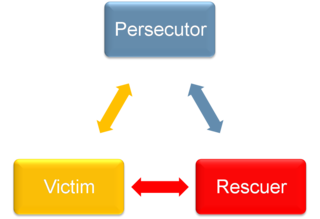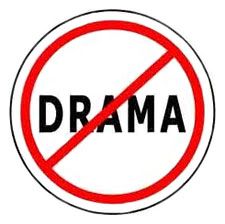The thing I see that keeps us from getting there was described years ago by Stephen Karpman as the Drama Triangle. Its a way of seeing the world that leaves us emotionally immature because it takes the "I" out of the equation. In other words, it strips us of all of our power. When we engage each other from this perspective, we do so from one of three positions.

Most often liberals enter the drama triangle from the position of "rescuer." We see some injustice in the world and want to make it right. The problem is...the role of rescuer requires that we define someone as the victim and someone as the persecutor. And that's where we get locked in. We not only deny our own self-interest (that's where we take the "I" out of the equation), we strip the victim of their power and blame/demonize the persecutor.
Once we've bought into this frame, from which the "I" is excluded, we're locked in and travel around the triangle playing the other two roles as well. If you've seen situations where you or others are at the mercy of circumstances or another person, you're identifying with the victim role. And when we attack anyone who doesn't agree with us, we're playing the persecutor.
All of the positions on the drama triangle are there to deny one thing...responsibility for oneself. It's all a massive game to find a place for blame. Of course, no one on the triangle is ever willing to accept the blame and so the conversation merely escalates...hence the drama.
Too many of our political conversations are caught up in this kind of drama. As I just noted in my last post, Markos provides a perfect example. He wants to capture the role of victim because President Obama is not fighting for him. He defines Obama as the persecutor by making him the cause of the despair among Netroots Nations attendees. Finally, he alludes to his own persecutor role by suggesting he won't fight for Obama. Nowhere in any of that does Markos talk about using his own power to fight his own battles on the issues he cares about.
We do this as well when we imply our own powerlessness against the money in politics or the media's role in defining the issues/candidates. Of course there's some truth in those claims. But the minute we see ourselves as powerless against them, we've entered the drama triangle.
Once the drama is engaged, there is no potential for solutions. That's because at every turn we've given up the one tool we have to affect change...ourselves. Our focus has turned completely to the "other" on the triangle. And so we feel powerless. Because we are.
The only way to avoid that is to completely step off the frame of the triangle and put the "I" back into the equation. We are not the victims of anyone else. And we don't need to rescue or demonize anybody. We need to act on behalf of our own self-interests by doing what we can to change things. As Gandhi once said, most of the time those actions will seem insignificant, but its important that we do them. The truth is that blaming someone else accomplishes even less.
So if we want to see change, and if we actually see ourselves as "the change we've been waiting for," our motto should be NO MORE DRAMA.





good post.
ReplyDeletea long while back, pre-Obama, greenwald had a good post about the conservative penchant for outrage and self-pity. your post generalizes that, de-partisan-izing greenwald's point (indeed it becomes applicable to him).
His post: http://www.salon.com/2008/10/02/self_absorption/
Wow - thanks for that. I read it but am still processing it.
ReplyDeleteI agree that he's addressing the same thing and applying it to people on the right. Its fascinating to hear him - of all people - defining it this way.
But there's something about how he sees power that is very different than how I do. He seems to see it only in majority or institutional power. Perhaps that's why he still seems to embrace a victim position himself - he doesn't own his personal power.
I hope that makes sense. I'm trying to write in a few words what likely requires much more time/thought.
welp he's a libertarian - so naturally all bad things are institutional (government specifically) for him. :)
DeleteI decided this week after thinking things through to try to stay out of the drama by giving examples of what could or will occur in the event of this or that happening. Giving folks something to think about rather than fight against.
ReplyDeleteI'm also guarding my tongue when it comes to insults. I think we do ourselves more harm than good when we start a conversation with "listen moron" instead of something else.
I'm finding myself more and more annoyed at the constant complaints about "the media-industrial complex" and the 1% who supposedly control everything. Yes, these things have a huge influence on our lives. But you're right that the minute we assume that they can control us is the minute we give up the power to effect change.
ReplyDeleteI'm also finding myself more and more in the self-interest camp. I advocate for liberal causes not because I want to save the victims from the persecutors but because I believe those causes will make the world a better place for ME and MINE.
The fact that it helps others is just gravy.
I think a lot of progressives have difficulty thinking this way because they've been propagandized into believe that self-interest is the purview of Romney's of the world and that the only pure route forward is to never think of yourself.
Fuck that.
I can't agree. From my perspective as a person interested in the philosphy of politics and science, it should be argued that taking the "I" out of any equation is the best possible starting point when trying to solve a problem. Only then can one take an unbiased stance and begin to look at evidence without prejudice.
ReplyDeleteFeeding one's ego by "empowering" one's self with a concept of a powerful "I" is the first step to being a victim of one's own confirmation bias. The occupiers are just as philosophically naive as tea baggers or christian right or sharia muslims in this regard. Without removing the ego completely from one's method of analysis, then the all too human temptation to give credence to evidence that supports one's stance and ignore evidence to the contrary is overwhelming.
I think the point is that it is impossible to remove the "I" from the equation and that the attempt to do so leads you into the most egotistical trap of all: the idea that you can remove yourself from the equation. If you believe that you have succeeded in removing yourself then you will be incapable of recognizing when you start to take on the very aspects of those you believe you are fighting against.
DeleteAppreciate your post and perspective! Great use of the drama triangle and its roles. If only politics could take on a more positive approach, creating what we need and want.
ReplyDeleteHave you heard of The Power of TED* (*The Empowerment Dynamic) written by David Emerald? TED* offers the alternative roles of Creator, Challenger, Coach.
Imagine a Creator in politics, working toward want we want rather than a Victim orientation always reacting to what we don't want. Imagine a Challenger rather than a Persecutor. Imagine a Coach rather than a rescuer.
Check out the book and website www.powerofted.com. Let me know what you think.
kathy